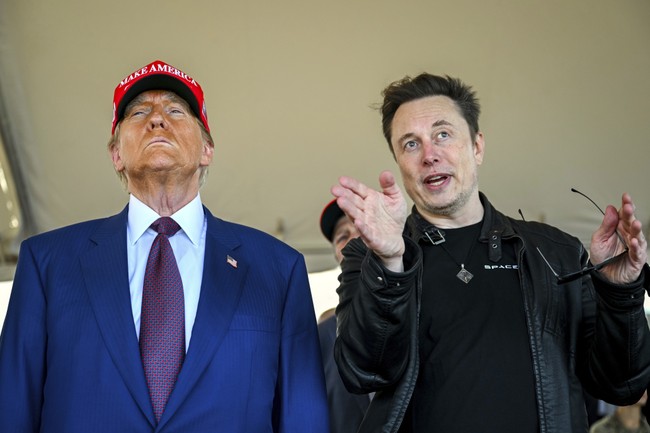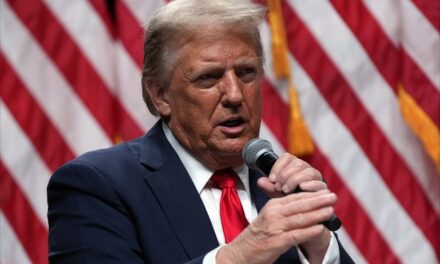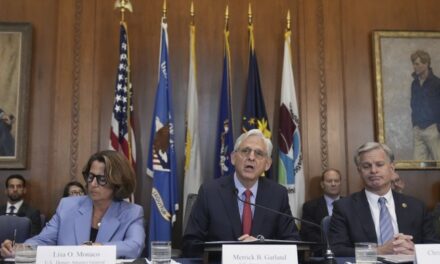We support our Publishers and Content Creators. You can view this story on their website by CLICKING HERE.

The federal workforce is the equivalent of the Soviet Nomenklatura.
The big difference between the Soviet bureaucracy and the US federal bureaucracy is that a much larger percentage of the federal workforce gets the special benefits that were reserved for top Communist Party members in the Soviet Union.
Advertisement
The Daily Wire’s invaluable reporter, Luke Rosiak, reports on the sorry state of the federal workforce and on the Department of Government Efficiency’s determination to reform a broken system.
94% of feds are still working from home–the EPA had poisonous water *in its own headquarters* because it was sitting in the pipes stagnant from disuse.
USDA inspectors claim they inspect food facilities for safety issues *from home*.
“As if it’s March 2020,” @SenJoniErnst said
— Luke Rosiak (@lukerosiak) December 5, 2024
The VA’s website: “At VA, you can break away from the traditional 9 to 5, 40-hour workweek without sacrificing the opportunities and benefits that come with job security.” One-third of calls to one mental health hotline for veterans went unanswered
— Luke Rosiak (@lukerosiak) December 5, 2024
Elon Musk and Vivek Ramaswamy are leader the charge to slim down and streamline government agencies which now seem to exist mainly to funnel vast sums of funds to useless bureaucrats who see their jobs as little more than a license to gum up the workings of the US economy.
There is a lot of work to be done.
Only 6% of federal employees work from an office full-time, and a third are fully remote. And some aren’t actually working when they “work from home,” a Senate investigation found.
“Washington is still operating as if it’s March 2020,” Sen. Joni Ernst (R-IA), the chair of the Senate DOGE Caucus and the report’s author, wrote.
“Just three percent of the federal workforce teleworked daily prior to the COVID-19 pandemic. Today, six percent of workers report in-person on a full-time basis, while nearly one-third are entirely remote,” the report states.
Government office buildings have an occupancy rate of only 12%, yet the government spends $16 billion a year to operate them. Even the head of the General Services Administration, which manages federal real estate, works from home in Missouri.
“You may be more likely to see a ghost than a bureaucrat haunting the halls of some government buildings in Washington, D.C. these days,” Ernst continued.
Office buildings are so empty that the water supply at the office of the Environmental Protection Agency — which is tasked with ensuring clean drinking water — was left stagnant for so long that it developed dangerous bacteria, according to the audit. But unions have demanded that full individual workstations for each employee be maintained for the rare occasions they are used, in addition to demanding that members be allowed to work from home.
Advertisement
The EPA is so bad at its job that its own water supply is dangerous due to neglect. You can’t find a better metaphor for government than that.
— Inez Stepman ⚪️🔴⚪️ (@InezFeltscher) December 5, 2024
Bureaucrats are so entrenched that many choose not to work at all, finding creative ways to fool the few tools the government uses to ensure that absent employees are actually doing the work they are supposed to.
President Joe Biden used his 2022 State of the Union to say that federal employees must return to the office, and his chief of staff repeatedly demanded that cabinet officials follow through because “there’s no substitute for face-to-face.” Yet the Biden administration signed a contract, in the waning days of his presidency, with the Social Security Administration’s (SSA) union locking them into telework through 2029.
That’s despite the fact that administration just completed a $120 million office renovation on a massive SSA headquarters that is 91% unused. One SSA employee ran a personal home inspection business for three years while supposedly doing his job from home, having his mother occasionally send emails from his computer
With a Republican trifecta–control over the House, the Senate, and the presidency, Republicans should be in a position to get rid of public employee unions, but don’t count on this happening without a 60-vote majority in the Senate. Not only will Democrats fight and die on this hill–public employees are a key constituency of the Democrats and one of the secrets to their hold on big city politics–but chances are good that some Republicans will work to sabotage any attempt to rein in the power of government workers.
Advertisement
The federal government is the largest employer in the United States, and when you toss in state and local governments about 25 million are government employees, blowing away any employer in the private sector. That’s a large chunk of the entire workforce and a powerful political constituency that is tied to other unions and nonprofits, all of whom would mobilize to protect their fellow union members.
Federal employees get paid more when their offices are in high cost-of-living areas. But at some agencies, up to 80% of teleworking employees now live in lower cost-of-living areas, while still collecting the higher pay. Some agency heads have told Congress that they have implemented policies requiring employees to come to work a few days per pay period, but reports from the ground suggest that’s not actually enforced.
More than 90% of Department of Housing and Urban Development employees work from home and are not required to come to the office more than once a week. One HUD employee — a former union president — allegedly got a DUI while supposedly working from home. Remote work enabled another woman to hold two six-figure government jobs at the same time, with each employer thinking she was working full-time.
Still, President Trump will likely be able to use a bunch of tools at his disposal to force federal employees back into the office, and any resignations caused by the shift in working conditions will be welcomed rather than lamented.
Advertisement
Government is perhaps the only industry in which the bosses actively reward inefficiency. Every time a government agency fails to do its job well, Congress rewards it with a higher budget to address the issue. In the private sector, failure usually leads to restructuring; in government, failure leads to larger budgets.
Elon Musk and Vivek Ramaswamy understand this fact very well. The real question is whether the elephantine bureaucracy can stubbornly wait them out and use inertia to blunt their efforts to prod the agencies into reform.
I don’t know who to bet on. Will two of the smartest minds in America win the battle, or the agencies whose specialty is protecting its perks and pay?

 Conservative
Conservative  Search
Search Trending
Trending Current News
Current News 







